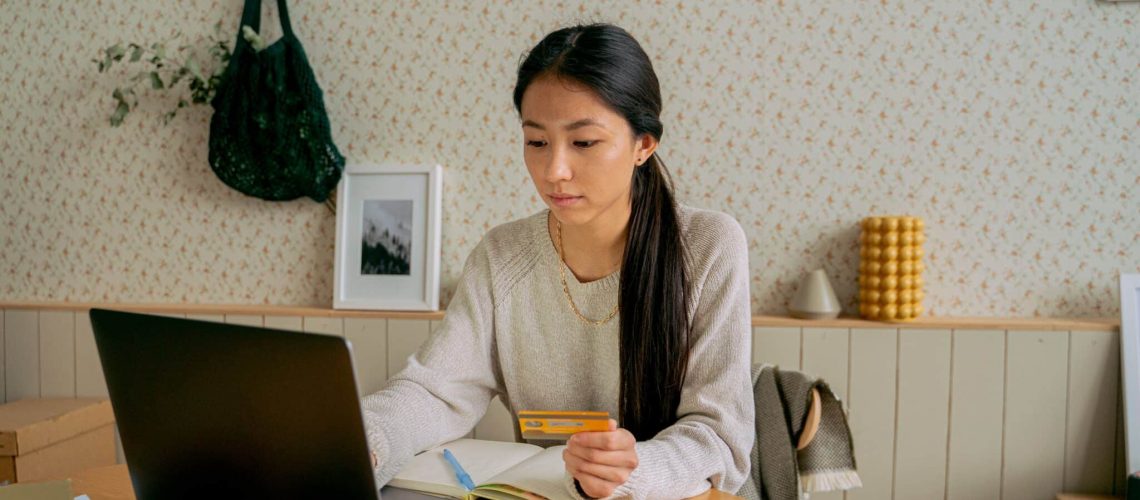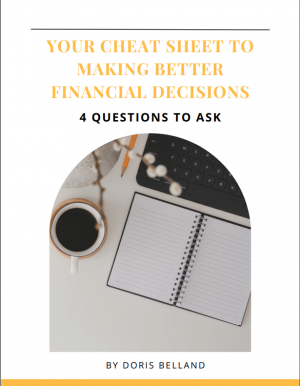Spoiler alert: In today’s post, I’m going to encourage you to spend more money. 💰
That’s the counterintuitive bit.
Don’t worry, I haven’t lost my mind. 😉
{There’s definitely a catch.}
I’m not encouraging you to do anything that is harmful for your finances.
In fact, it’s the opposite.
The approach I’m championing today will help you make much better use of your money and bring you a lot more joy from those dollars.
A few recent interactions have had me thinking about how women spend money…
And how they’re not doing themselves a favor in the process.
We all know that overspending is a problem. 💸
But not spending enough money in the right way for you can also be a problem.
Today, we’re looking at how you spend your money. I’ll share some of the areas in my world where I splurge guilt-free.
Why this matters:
- Your 90-year-old self called and she wants to talk about how you use your money. 📞
- She insists that conventional approaches to spending aren’t serving you well. She should know; she’s been around a long time and has the benefit of hindsight.
- Apparently there’s a much better approach. 🤔
- But first, you need to let go of some assumptions.
- It’s worth taking a minute to do this because you will eventually be that 90 year old (your health willing). By the time you get there, you want to look back with satisfaction about your choices; not regret.
First, a story.
A gallon of ice cream
When I was a kid, my Dad used to buy ice cream in gallon tubs. For my fellow Canadians, that’s almost 4.5 liters of ice cream.
If you’re one of my American readers, you already know that’s a LOT of ice cream in one container.
It tasted awful. 🤢
My Dad was so pleased with himself. All that ice cream for such a low price! He either didn’t notice that it tasted like a block of sugar in ice crystals, or he didn’t care. 🤷🏻♀️
And you know what? I get it. It’s a function of what he experienced as a child.
As one of ten kids who were raised on a farm, there weren’t many extras. Money was always tight.
As an adult, every purchasing decision was driven by how much the thing cost. If he could get it cheaper, he did.
Price was the ultimate motivator for everything.
What that did for me, though, was make me care a great deal about quality.
When I was developing my values-based money management system, I spent a lot of time reflecting on what I value most.
To no one’s surprise, buying quality goods is right up there on my list.
Which affects how I spend money.
My shoe thing
What’s the one thing you love?
{Ok, we have more than one, right? 😊}
I love shoes.
I will happily pay what others consider to be a stupid price for shoes if:
a) I love them; and
b) they fit perfectly; and
c) they’re high quality.
If I can get them on sale, great; but if not, so be it.
I’m willing to pay for comfort (more on that in a sec), the right fit, and superior quality.
Like these gems:
I’ve owned them for years and they still look new.
Every time I wear them, they bring me joy, both in how they look on me and how they make my feet feel.
One of my friends had an interesting reaction to them. She said, “Do you know how many pairs of shoes I could buy for that price?”
Yes I do. And that’s the point I want to make today.
Conventional spending advice is misguided
One of the most interesting things I’ve noticed in my work with women and their finances is that the words “frugal” and “sensible” tend to show up a lot.
Those words sound good, don’t they?
Who doesn’t want to be sensible and frugal with their money?
==> ME – I don’t! 🙋♀️
And I don’t want you to be “sensible” and “frugal” either, because that’s a lousy way to use your money.
Money is meant to help you accomplish your goals and fund the things that matter most to you…
The things you love and value.
🔸What’s a sensible decision anyway?
🔸Is it buying three pairs of shoes to my one? Is that sensible?
Not for me. That would represent poor value in my world.
I don’t want to wear shoes I feel meh about or that don’t fit like a glove – because I care about what I put on my feet.
And is a frugal approach to money laudable and valuable?
Not if you apply it to the areas you love and cherish.
If you cheap out on areas that would bring you great joy out of a desire to be frugal, I would argue you’re not using your money well.
That’s missing the point of money.
Splurge on the things you love
✨ My mom gets her nails done every six weeks – because she loves it. 💅🏼
Is that a smart way to spend money? For her, you bet.
✨ I have a friend who is about to spend a large chunk of change getting married overseas, then honeymooning in the Maldives.
Worth the cost?
For her, absolutely. She values travel and memorable experiences.
✨ I value comfort and beauty. When I travel, I like to stay in nice places where possible.
During a recent trip to Spain, we stayed in a former palace whose dining room was spectacular.
This is where we ate breakfast every morning we were there:
The experience was worth every dime.
{The food – omg… 😍}
✨ One of my male friends spends a lot on cars.
Does it make sense since I’ve argued that cars are a liability?
For him, 100%.
He’s been obsessed with cars since he was a toddler. Knows every. last. detail about the cars he’s interested in.
{Just ask him at a party. Make sure your drink is refreshed, though, because you’ll be there a long time.}
You know the problem I have with the label “sensible”?
It’s a judgement. ❌
The thing is, the only person who can judge the sensibility or the wisdom of a purchase is you.
No one else gets a say.
So go ahead and splurge on the things you love unapologetically.
Assuming this of course
And now we get to the caveat.
No spending should harm your finances.
My car-obsessed friend? He has plenty of cash to spend on cars. He’s not harming his future by pouring his dollars into his obsession.
Even if you don’t have a big pocket of cash kicking around to splurge on all the things you love, you can still spend guilt-free…
… by eliminating the things you don’t care about.
I can afford to spend lavishly on the things I love because I don’t spend in other areas:
- We’ve been a one-car family for the past two decades, despite having two active kids and two businesses to run. We’ve saved tens of thousands of dollars by not buying a second vehicle.
- We keep our cars for more than a decade.
- We almost never buy take-out. I can’t remember the last time we bought take-out. It’s just not our thing, which saves us a lot of money.
- We don’t go out to restaurants very often – maybe a couple times a year. (When we do, though, we pick a nice one.)
Your guilt-free spending
I encourage you to make a list of the things you choose to splurge on because they matter a great deal to you and you love them.
Without feeling the need to explain or justify your choices to anyone.
Here’s a small list of some of the areas my clients are splurging on:
- Travel more often
- Travel to nicer places
- Travel in greater luxury (Spotting a trend here? Travel is high on many women’s list!)
- Good wine
- Gardens and plants
- Weekend trips with the girls
- Yoga or gym memberships
- Nice clothes
- Tech toys
- Convenience – paying others to do jobs you don’t want to do
- Massage
- Visits to the spa
- Books
- High quality food – for foodies
- Sports
- Cottage-related spending
- Mani/pedis
What will it be for you?
As you make your way through what I call the Spending Season, buying items for all your peeps and upcoming gatherings, give a thought to the most important person in your world:
YOU.
Hop into the comments below and let me know what you intend to splurge on in the coming weeks.
🔸Something that will bring you joy.
🔸Something that will make you think, “I love this!”
(Without harming your finances. Remember to free up cash by giving up stuff that just doesn’t matter all that much to you.)
Let me know. I want to share in that joy.
And for the love of God, when you’re shopping for food, buy decent ice cream.
Unless you don’t care about taste, in which case my Dad has a great recommendation for you. 🤣
Much love, ❤️
Doris
Want a proven process to help you make savvy financial decisions that are in your highest, best interests every time?
Grab your copy of my FREE Cheat Sheet.
In it, you’ll discover the four key questions to ask yourself, in order, to gain total clarity on the right financial decisions for you.
This process works for all decisions, big and small.
Make indecision, second-guessing, and analysis-paralysis a thing of the past.


